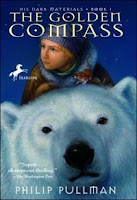 The Golden Compass, as a movie, bombed. As a book, it was much more well-received adnn the appeal is obvious. The question really is - as with many movie adaptations - why it was indeed made into a movie at all: as a scene setter to the His Dark Materials trilogy, it serves its purpose as just that: a table-setter. As a self-contained novel, however, it lacks a certain je ne sais quoi. Perhaps this is a direct function of it's status as a children's novel (Classic? It's now 15 years old). Along with Harry Potter, it's regarded as one of the great teen novels of the past twenty years.
The Golden Compass, as a movie, bombed. As a book, it was much more well-received adnn the appeal is obvious. The question really is - as with many movie adaptations - why it was indeed made into a movie at all: as a scene setter to the His Dark Materials trilogy, it serves its purpose as just that: a table-setter. As a self-contained novel, however, it lacks a certain je ne sais quoi. Perhaps this is a direct function of it's status as a children's novel (Classic? It's now 15 years old). Along with Harry Potter, it's regarded as one of the great teen novels of the past twenty years.Perhaps as a result of this -or a change in Panatlantic vocabularies - The Golden Compass is known in the United States as "The Golden Compass", rather than it's English title "The Northern Lights". It's a strange decision, really, considering the only compass-like object referred to is the heroine's mysterious alethiometer.
Set in a parallel world, the similarities the Potterverse are obvious: there is a child hero (Lyra) whose destiny is important for the future of the entire world. Adults are aware of this while the child remains unaware, meaning the only adults that are trustworthy are antiestablishment figures: gypsies, witches and daemons, the ever-present animal companions of humans. This obvious lack of tustworthiness means for dark undertones beneath a children's fantasy.
The greatest difference between Pullman and Rowling is how easy the plot is to decipher. In the first chapter, certain words are use which can mean - perhaps to the inquiring mind, perhaps not - only one thing. How that affects the characters is also easy to read. Whereas Harry Potter is aware of his special nature and the readers are left to discover at the same time as the main protagonists how that plays out, Lyra is an unencumbered (relatively) free spirit, not weighed down with the responsibilities of the world, but acutely aware of right and wrong: we also pick up enough early to realise just what the mysterious Mrs. Coulter is up to.
Although easy to plough through, there are few characters with whom you can empathise, a reality faced when adults read fiction involving child heroes - but Pullman doesn`t rely on teen angst like Rowling (how many fights did Harry have with Ron? I hope it irritated you as much as me? Hmm. How do I add another layer and 50 pages to "The Deathly Hallows". I know, I'll make Ron and Harry get aggro at each other. Again! 15 billion pounds can't be wrong, can it?" Completely failing to realise that we didn't really care how good HP: TDH was, just that we wanted to see what happened at the end. Side-tirade on JK Rowling is now finished. Probably.) but is obviously enamoured with making Lyra as resilient as kids generally are under stress. Where adults fail to deal with things emotionally, kids are often able but mostly at terrible cost to their futures.
The only characters fully coloured are Lyra and the witch-queen Serafina Pekkala, the rest two-dimensional which makes empathy even tougher. The best stories allow you to relate to the characters or at least identify with their motives. By choosing to make his heroine prepubescent, Pullman - I hope consciously - withdraws an element of identification and simply concentrates on his story, which is bound by fundamental creationism, a Neal Stephenson-type Royal Society science and the relationship between Lyra and her two best friends, her daemon Pantalaimon and the Armoured Bear, Iorek Byrnison. As we said earlier - fantasy books in a series work best when they are able to be read in a self-contained way, and take or leave the series. The Potterverse was wonderful in this way over the first four tomes, where Pullman seems to be drawing readers in simply to be able to expand his story later.
And let's not forget perhaps the most fundamental plot flaw I've seen since watching episodes of Eureka - the alethiometer should make Lyra omniscient. Surely omniscience should allow the heroine to plan things and know the outcome of those plans before even putting them into practice? Following that reasoning, the work should end after Lyra learns to interpret the symbol reader well - after about 150 pages.
I can't recommend it, but it wasn't bad either. Tennis balls. Just.
Cover image courtesy: avclub.com. We recommend their blog "Book vs. Film".


Sorry to hear you didn't enjoy this too much. I think your point about the alethiometer's power is a good. Although, I think I can forgive slight indulgences with plot devices as it's a junior book. Nonetheless, great review! Cheers.
ReplyDeleteMy own review, if interested: Northern Lights by Philip Pullman